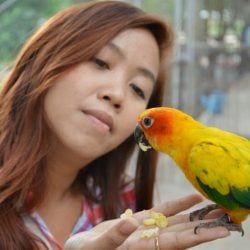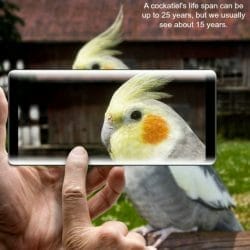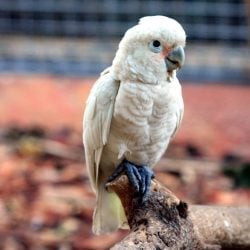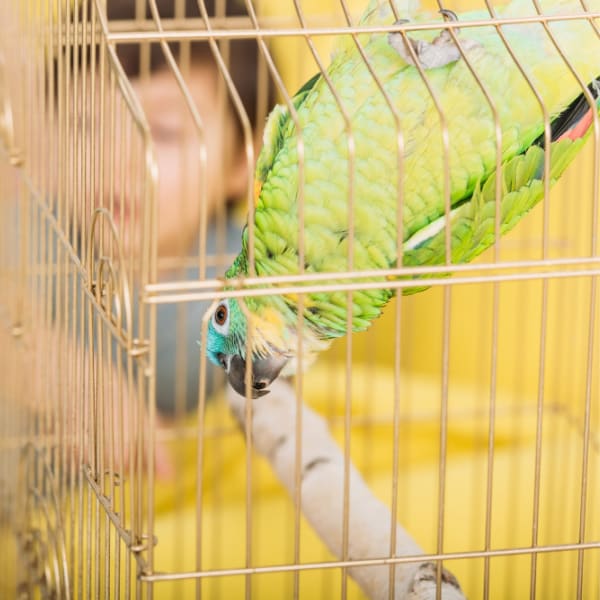Last Updated on by Mitch Rezman
We recently shared a link on Facebook from an article in Flock Talk produced by The Garda Aviary, a rescue. The message given to the Girl Scouts on this visit was “parrots do not make good pets because they are flocking animals and are extremely loud and noisy, and they will most likely outlive their own persons parrots can live up to 80 to 90 years old”.
The posting of the article brought the following response from Melanie Allen of Hagen
The pet industry should be very concerned with this strategy…
I don’t know that it’s wrong…the first line is good PR piece because it shows Girls Scouts getting involved in community-the parrot community.
This group of young girls learned many interesting facts about Parrots.
That’s cool-many scholastic lessons can be taught to our younger generations with the help of parrots. What alarmed me was the last item listed as part of their learning experience with Garuda Aviary… “That parrots do not make good pets”. They didn’t learn-“Parrots may not be good pets for many people”. It was pretty finite.
My concern that the Flock Talk group is imprinting a very negative and final attitude on impressionable young people stems from not just a manufacture perspective, but from a parrot enthusiast that is a very involved member of the avian community-to include properly run rescues and rehabilitators.
I’ll be the first to agree that parrots do not make good pets for a great number of people that either have them or have had them-hence the need for parrot adoption facilities-and perhaps sanctuary set ups for birds that are unable to be return to companion lifestyle.
BUT, not all of companion parrots are in bad situations. And, not all pet bird owners are ill equipped to share their life with a parrot as a companion. Our young people need to be educated on the pros and cons of sharing a life with a companion parrot and that as a pet, a parrot is a very complex creature that must be cared for physically and intellectually.
Finite attitudes of this nature create risks for the parrots and the future for all parrots in companion lifestyles. Advancements in avian medicine, avian nutrition, and care begins with the pets- and is very much applied in wild parrot conservation endeavors. Companies such as Hagen, Zupreem, Lafebers to name just a few that work to on better products for the companion bird.
If there are no companion parrots in our lives, companies such as these do not have reason to exist. And, if they’re not in existence to continuously go forward with better product development, there would be no charitable donations to groups that are taking care of parrots in sanctuary organizations that stem from profit and parrot enthusiasm of these companies.
Where would parrot sanctuaries get their support? The general public? For the average citizen in the US, one that does not have a tie to parrots-there are many charitable causes-both domestic and global that will have precedence over the parrots in a sanctuary. The avian community has been the driving force behind better products, better toys, better nutrition, and most certainly growth of knowledge in avian health & care, and also fundraising for parrot sanctuaries & rescues and wild parrot conservation projects.
This type of propaganda on youth has happened in Europe-where many pet shops do not sell parrots-or products that cater to them. In the United Kingdom, the pet parrot has lost in place in the pet industry in the past decade. At one time many pet stores had parakeets and an occasional Amazon for sale.
Now, it’s a rarity. The reason-the media went crazy infiltrating schools, youth groups, everything that comes in contact with the young generation-with messages that supported the claims that birds do not make good pets.
“They shouldn’t be in cages”.” They are too noisy”. I couldn’t believe it-so I reached out to my aunts and uncles, and cousins in England. And, yes –my cousins’ grandchildren think it’s horrendous that I have a pet parrot-in a cage!
– Melanie
Video – How a Parrot Learns its Name in Wild
Catherine found this interesting blog post from the Parrot Nation blog with a tongue-in-cheek description of how you can prepare yourself for bird ownership. The first paragraph sets the tone.
“Take a big bite of carrot. Chew it up well, but don’t swallow it. Now go out to your dining room and spew it all over the wall. Leave it there until it dries. Get a sponge and a scraper and scrape it off the wall. Repeat at least three times a week”.
The flipside to all of this is there are many humans who don’t make necessarily good bird companions. We had an individual come into the Birdie Boutique last week to order some breeding cages. The cages he wanted us to order were 21 inches wide and divided. He wanted three of them. These cages are typically used to breed canaries. We always ask about the species we’re dealing with so that we can properly match the equipment to the birds. His response was jaw-dropping. He wanted to put four pairs of breeding lovebirds and one pair of breeding Pionus parrots in the five 11 inch wide compartments with the sixth 11 inch wide compartment designated for all the baby birds. We asked him how much he knew about breeding? He said he didn’t but he was learning. He needed the cages right away because he already bought the birds and they were all living in cardboard boxes in his home. He then basically asked us to teach him everything we knew about breeding birds. We don’t do this often we just asked him to leave.
So where does this leave us? Do birds really make bad pets? Do humans really make bad companions? Neither statement is a hard truth. We feel the best approach is education. Education before you get the bird is especially important. Understanding your abilities, your lifestyle and the expectation of family members and friends who may be asked to participate in the care of your bird(s).
Education is ongoing. We’ve been doing this for almost 20 years and we feel we’ve only just scratched the surface in terms of learning about their behavior. If you’ve spent any time recently on WindyCityParrot.com you’ll notice that we are placing buttons in almost every category leading to articles on proper bird and parrot care. As we learn we want you to learn and be confident in caring for your birds. .
Mitch Rezman
CMO
Windy City Parrot, Inc
Comments from our Facebook Fan page
-
Jo Young
I also live in the UK and so far no-one has ever been horrified that I have 3 African Greys and many often say they would love one, but I do explain that with a parrot comes a lot of responsibility, that as intelligent free spirited creatures they are never pets but companions who need a lot of interaction and attention from their human flock.
I explain they have the intelligence of a 5/6 year old child but the emotions of a 2 year old they can be messy and loud but are incredibly rewarding if you the human flock member put the effort in.
As for my 3 they are all happy and content with their own cages I have never had a problem getting cages I use Northern Parrots for cages and toys always have and I buy my parrot food from the supplier who specialises in birds. I have found with a little effort you can find almost everything you need in the UK although it would be great if we had more places like Windy Parrots here in the UK too
As for the care after we are gone, our will leaves out home to the parrots, our children are adults and understand this and we are lucky because both have said they will be their guardians and will ensure their parrot siblings are well taken care of.
Mum of3 AGs -Peaches 9, Vincent 7 and Sophie 3
Author Profile

Latest entries
 Bird & Parrot CareJune 20, 2025Understanding the Best Way to Use Prevue Pets Mimic Me Voice Trainer
Bird & Parrot CareJune 20, 2025Understanding the Best Way to Use Prevue Pets Mimic Me Voice Trainer Bird BehaviorJune 6, 2025How Do I Keep My Parrot From Dumping His Food Every Day?
Bird BehaviorJune 6, 2025How Do I Keep My Parrot From Dumping His Food Every Day? Birds & LightingMay 16, 2025I Am Seeking Clarity About Lighting for My Birds Cage
Birds & LightingMay 16, 2025I Am Seeking Clarity About Lighting for My Birds Cage Bird RescueApril 29, 2025How Do We Re-Home a 17 yr Goffin Cockatoo?
Bird RescueApril 29, 2025How Do We Re-Home a 17 yr Goffin Cockatoo?




It is true that some people are horrified that I have five parrots.
I have an orange winged amazon an African grey,a greenwing macaw,a Ducorps cockatoo and a galah.
My first bird was a rescue that I persuaded a friend to give me as he had bought it in a pet store. He was given no information about caring for this bird and the store sold him a cage that wasn’t even big enough for a budgie let alone an amazon.
I then contacted a wonderful woman who breeds and takes in unwanted birds,she helped me by giving me info and suggested websites and books for me to do the necessary research so that we could care for our bird.
That was 8years ago.
Since then I have never stopped learning about my babies.
They live in London and I have found some great suppliers of cages toys and food for them but it is true that most pet stores in the uk no longer sell bird supplies.
I have even resorted to buying products from the USA as you have a much greater range of parrot products .
We have just had the very first parrot show in the south of England and there were seminars retailers and rescue centres present,I was amazed at the amount of people at the show as I have only ever met a couple of people who keep parrots, there are only 2 avian vets in London which I think tells it’s own story.
I sometimes take a couple of my birds to the park on sunny days “rare in the uk I might add” and many people are fascinated by my birds, some people say they would love a parrot and we have invited a couple of the more serious ones to our home so that they can see what it takes to really own one of these incredible creatures.
Most are put off by the mess noise and expense but the true animal lovers usually want to know more,these are the ones we encourage to do more research before they make an informed decision.
There will always be those that look at us like we have 2 heads, there was a “parrot behaviourist ” at the show who we spoke to, when I said I had a cockatoo he asked if the problems had started yet,I asked what he was talking about and he shook his head and said “you wait and see ”
My cockatoo is five years old, fully flighted and as happy as any bird I’ve ever seen I told him, I had to bite my tongue when he said that the problems would definitely come sooner or later .
So no more rambling,education is the key,parrots make incredible companions for those who are willing to give the time and love to them, I am really lucky in as much as I have met a wonderful young couple who run their own business training parrots, they have their own flock and their gentle loving approach to their birds is something I have never witnessed before,they have agreed that should anything happen to us they will take my babies so I rest easy that even though my flock will outlive me they will be loved and cared for for the rest of their lives.
I think windy city parrots should open a uk store so that people like me can spend lots of money on our birds.
Keep up the good work.
Regards
Karen